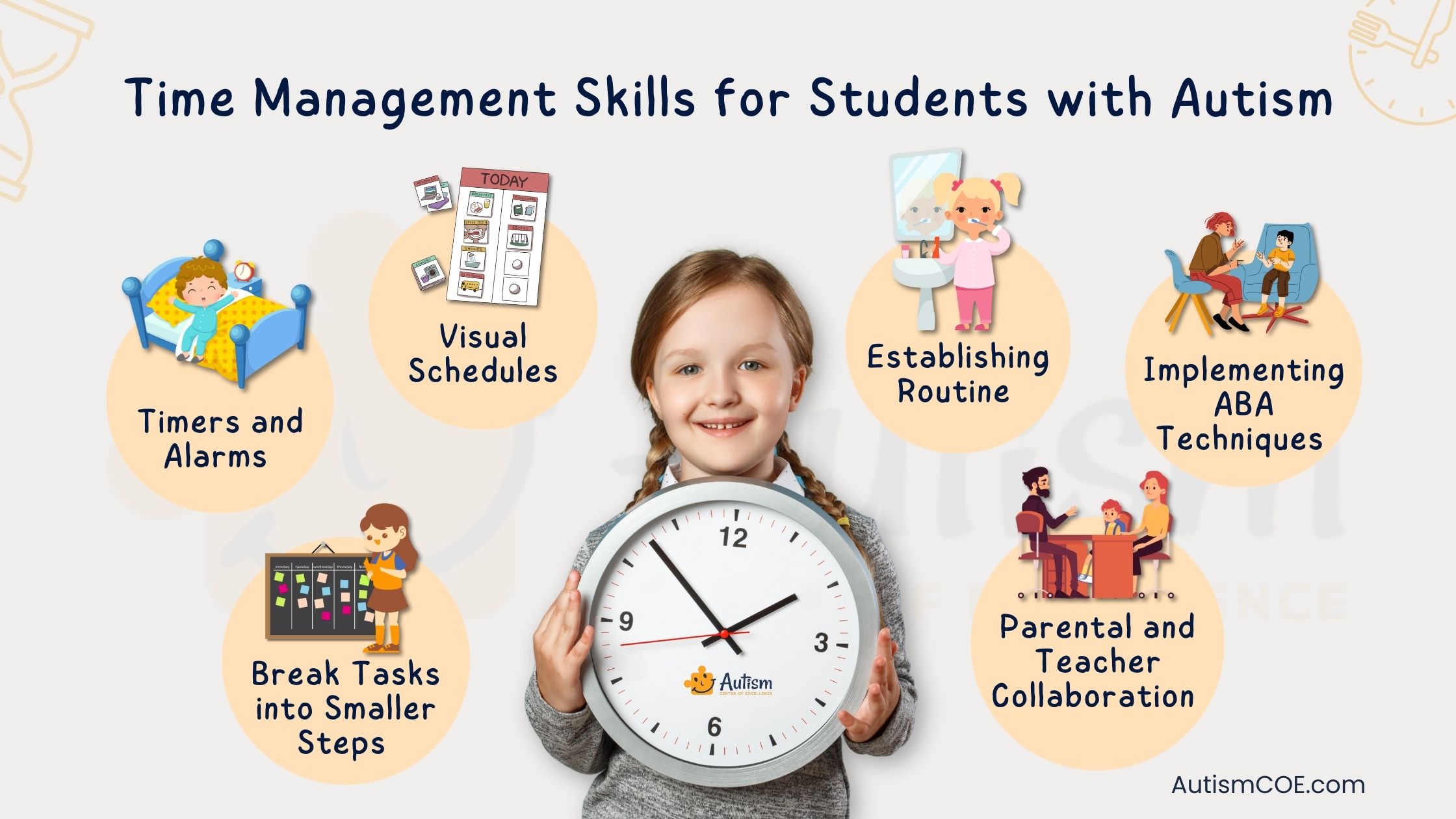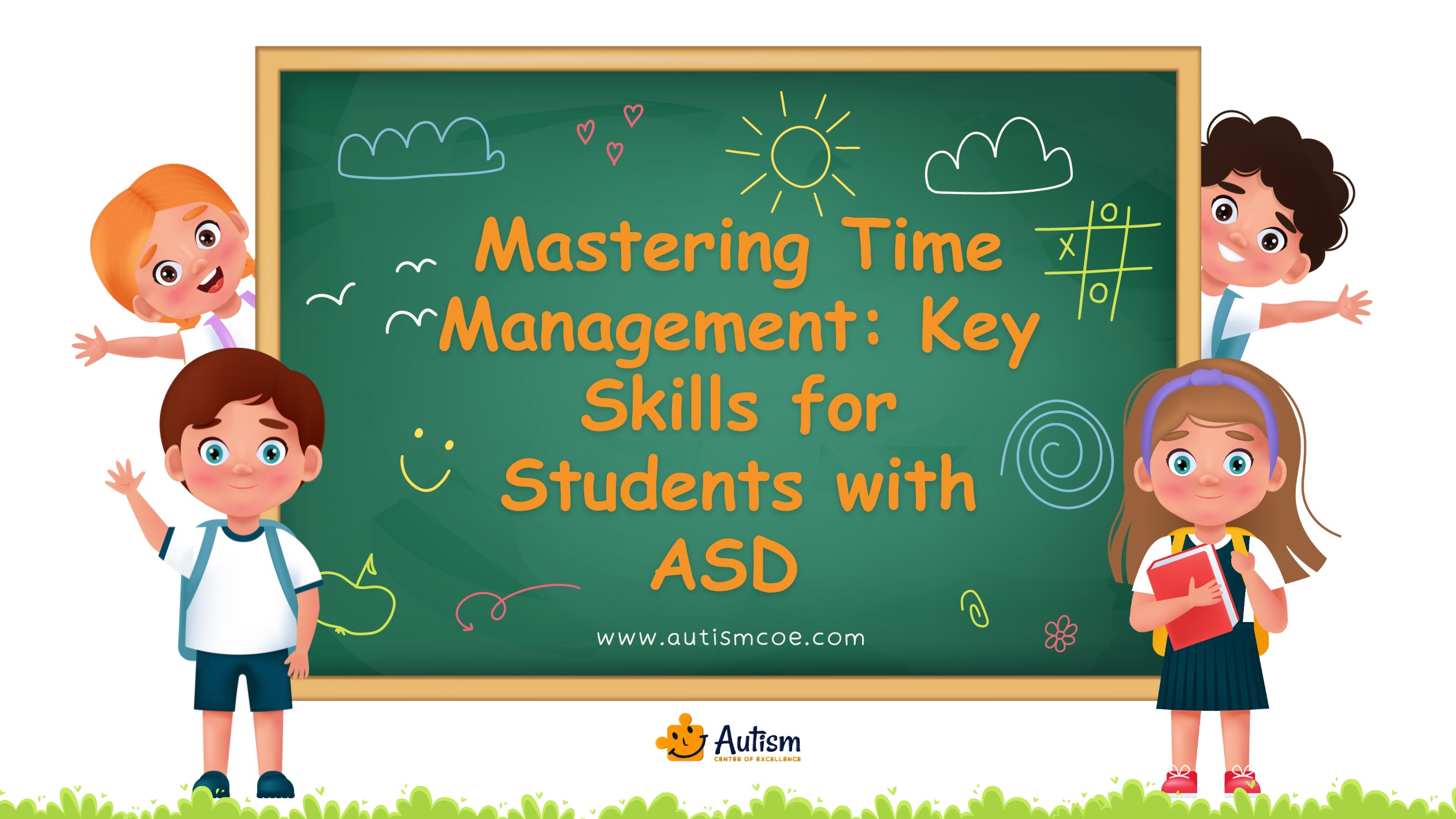We all have the same 24 hours daily, but sometimes there’s never enough. For students with Autism Spectrum Disorder (ASD), time management can be tough. However, time management can be mastered with the right skills and strategies.
In this post, we’ll look at the challenges children with autism face with time management and practical strategies to help them succeed. Whether a parent or educator, you’ll find useful insights and tips to help your autistic student or child manage their daily routines better and improve their School Readiness.
Common Difficulties Students with ASD Face with Time Management
Knowing their common challenges in this area is key to developing strategies that will help them succeed academically and personally. Here are some of the most common time management challenges faced by students with ASD:
Understanding the Concept of Time
One of the biggest challenges for children with ASD is understanding time itself. While most people have an intuitive sense of minutes, hours and days, time is an abstract concept for students with autism. They may struggle to estimate how long tasks will take or to understand the sequence of events.
Transitioning Between Activities
Transitions are tough for children with ASD. Moving from one activity to another, especially if it’s unexpected, can cause anxiety and confusion. These transitions can break their focus and lead to frustration or meltdowns.
Prioritizing Tasks
Prioritization is key to good time management, but for students with ASD, it can be hard to decide what’s most important. Non-prioritized tasks can result in spending too much time on less important tasks and neglecting more important responsibilities.

Why Do Children with Autism Struggle with Time Management?
There are several reasons why time management may be challenging for children with ASD, including:
➡️ Executive Functioning Differences
Executive functioning encompasses all the cognitive processes that enable one to plan, filter, and multitask. These are areas of difficulty for many children with autism, affecting their organization and planning of academic work and social activities.
Parents and teachers should provide appropriate Intervention to Support these skills so that the children can be as successful and independent as possible in their daily functioning.
➡️ Sensory Processing Challenges
Sensory Sensitivities can also be involved in this process to some extent. For instance, a noisy environment might hinder a student from concentrating on a task within the required time.
Certain stimuli can interfere with their timetable, and they can easily be distracted by noise or movement from other individuals and objects, greatly affecting their concentration and productivity.
➡️ Need for Predictability
A major characteristic of the autistic person is that they are rigid and prefer a routine schedule, which creates orderliness in their life. The main benefit is that children feel more comfortable in a structured environment and, therefore, are less anxious.
Such things as unstructured time or changes that are out of their normal schedule can be upsetting and cause stress and time management issues. For instance, changes in the plans may affect their mental preparation and coping mechanisms to the extent of compromising their ability to do so.
Time Management Strategies for Autism
Implementing effective strategies can help create a structured environment that fosters productivity and reduces anxiety. Here, different time management skills for students with ASD will be described to increase productivity and satisfaction during the day.
Visual Schedules 🖼️
Visual Schedules effectively explain to children with autism what the day will be like for them. Using pictures or icons to represent the activities can help ensure the child has a clear and predictable activity schedule. It helps lessen the level of anxiety and always has a timeline in front of you to focus on.
Timers and Alarms ⏰
Timers and alarms may help manage time for students with ASD. Using alarms for activities or changes of activities can help make auditory prompts that alert a person that it is time to shift from one activity to another. This method strengthens the understanding of time elapsing and contributes to concentration.
Break Tasks into Smaller Steps 🧩
Splitting bigger tasks into smaller, more manageable steps can make autism time management less scary. For example, instead of saying, “Do your homework”, you can break it down into steps like “First, do math problems 1-5” and then “Next, read pages 10-15 in your book”. This way, the child can see progress and stay motivated.

School Readiness for Time Management
Time management is key to school readiness so students can successfully manage their academic and personal activities.
Establishing Routine 📆
Having a daily routine can help autistic students. Start with a morning routine that includes waking up, getting dressed and having breakfast at the same time every day. Consistency helps build security and predictability.
Implementing ABA Techniques 📚
Applied Behavior Analysis (ABA) is a therapeutic approach that can teach time management skills. Through positive reinforcement, ABA Therapists can help children complete tasks within a time frame. For example, giving praise or a small reward for completing a task on time can reinforce the behavior.
Parental and Teacher Collaboration 🤝
Parent and teacher collaboration is key to time management in school. Sharing the same strategies and routines gives the child the same support at home and school. Regular communication to address any issues and make changes.
Enjoying Reading?
Join Our Weekly Newsletters!
Subscribe now to stay updated with our latest email updates.
Autism and Time Obsession
Some kids with autism can become obsessed with time, checking clocks or fixating on time. This may seem counterintuitive, but it can be redirected.
✅ Channeling Time Obsessions: If a child is interested in time, use that to your advantage. Incorporate time-related activities into their learning. For example, use a timer to time how long it takes to complete tasks and make it a game. That will help them learn time management.
✅ Balancing Flexibility and Structure: While structure is important, teaching flexibility is just as important. Help your child or student understand that sometimes plans change, and that’s okay. Gradual exposure to small, controlled changes will help them become more adaptable.
Frequently Asked Questions & Answer
What are the Primary Challenges Autistic Students Face with Time Management?
Autistic students can struggle with sensory overload, unpredictability and lack of routines, which can stop them from managing time effectively.
What Should I Do If My Child Shows an Obsession with Time?
You can introduce timing tasks where they must complete certain activities within a set time frame. This helps them understand time management and makes learning fun. Use games or competitions where they race against the clock, and you can create a fun environment where they can develop skills while exploring their interests.
How Can Teachers Help Students with Time Management?
Teachers can use visual schedules, timers and smaller task steps to support time management. Working with parents ensures consistency across home and school. ABA can also teach time management in the classroom.
Can Students with Autism Develop Good Time Management Skills?
Yes, with consistent support and tailored strategies, autistic students can develop good time management skills. Remember that progress may be slower than that of neurotypical students and requires patience and flexibility.
Conclusion
Time management is a skill everyone needs, but it is especially important for Students with Autism. By understanding their challenges and using the right strategies, we can help them succeed academically and personally.
Parents and educators can help develop these skills through consistent routines, visual aids and Positive Reinforcement. Remember, every small step towards better time management is a big win.
If you’d like more personalized advice, Book a Consultation with A Specialist Therapist who can provide advice and support for your child’s needs. We can help every student succeed.
Please Note: The content of this blog is for informational purposes only and should not be considered a substitute for professional medical advice, diagnosis, or treatment. Consult a qualified healthcare professional for personalized guidance tailored to your specific situation.

Bhavika Bhasin
Bhavika Bhasin is the Research and Marketing officer at AutismCOE. She works with children and adults with ASD. Her clinical research includes evaluating various available autism screening and diagnosis methods and their efficacy. She is currently developing a novel screening exam that is indicated to be more accurate than the existing available exams. She is also writes articles papers for various publications.


